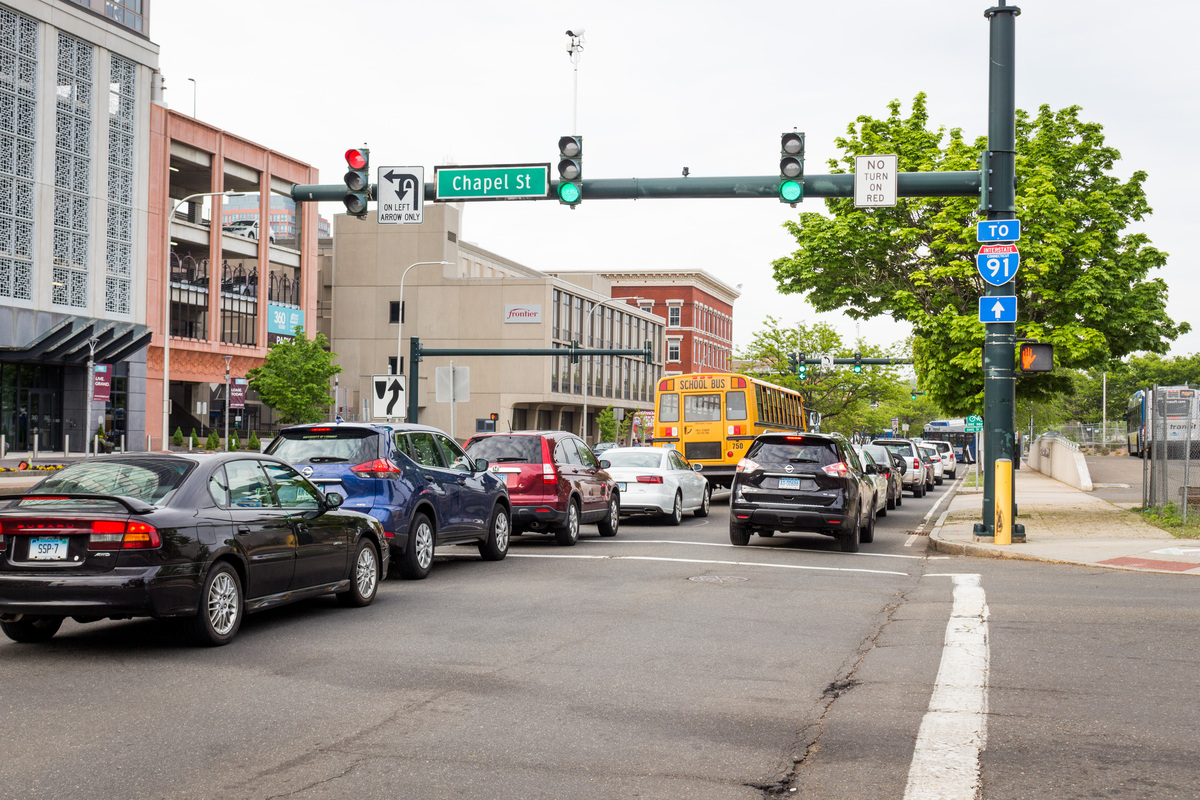Transportation committee hears speeding camera bill
Last Monday, 80 people testified at a transportation committee public hearing regarding HB 5971 — a bill that would install statewide speeding cameras to reduce traffic-related fatalities.

Daniel Zhao, Senior Photographer
Propelled by a drastic increase in traffic-related deaths and discourse surrounding increased traffic regulation, the Connecticut state legislature recently began hearing testimony on a bill that would install statewide automated speeding cameras.
Last Monday, the Connecticut General Assembly’s transportation committee held its first public hearing on HB 5971. At the hearing, 80 people shared testimony, with some of those in support of the bill detailing personal accounts of near-fatal accidents.
In 2022 alone, 385 Connecticut residents died in traffic accidents, a 22 percent increase from the 302 fatalities the year before. Addressing traffic accidents has become a matter of personal significance for many committee members as last month, State Rep. Quentin Williams was killed in a wrong-way driver collision.
“Traffic violence is personal to me because I have almost been hit several times due to cars not obeying traffic laws on my way to work,” Aishwarya Pillai MED ’23 wrote, testifying in support of the legislation.
Pillai added that she has had to personally treat victims of accidents at several high-risk intersections around New Haven. One of these cases, Pillai wrote, involved a law student who was hit at the intersection of York Street and South Frontage Road. The student was struck after visiting his sister at the hospital and died while receiving treatment.
During the hearing, Pillai explained that drivers around the South Frontage Road and York Street intersection, as well as many others in the city, regularly speed and run red lights because of limited penalties for doing so. The bill’s proposed speeding camera installments would ostensibly fix this problem by automatically flashing photos of drivers’ license plates and fining drivers after traffic violations.
“I pretty much walk everywhere I go and witness so many drivers dangerously speeding and running red lights across the city,” Abigail Roth, a member of Yale’s Traffic Safety Committee, told the News. “With so many people being injured and killed by traffic violence, it feels really important to push for change.”
Roth, who testified in support of the bill, said she has been pushing for greater traffic safety legislation in Connecticut — including automated enforcement — for a decade.
New Haven considered a red light camera proposal in 2009 after the deaths of a Yale medical student and a young girl the year before. Two years ago, the state legislature proposed another piece of legislation aimed at tackling traffic safety. The legislation, called the 2021 Transportation Safety Act, outlined the creation of a “Vision Zero Council” — a statewide policy research council — to combat traffic-related fatalities. But neither bill implemented automated traffic monitoring. If passed, HB 5971 would be the first of its kind to do so.
Concerns about automated traffic regulation largely revolve around discrimination and privacy infringement. During the hearing, Carol Platt Liebau, president of the Connecticut-based Yankee Institute, testified in opposition, arguing the bill would breach individual privacy rights.
“The people of Connecticut have the right to be secure in their property and to go about their business without being watched,” Liebau said.
Proponents, meanwhile, maintained that Connecticut’s automated traffic monitoring would follow similar models in other states, only taking photos of license plates.
“I think people don’t understand that the camera just takes a picture of the license plate,” Andrew Giering LAW ’11, who testified at the hearing, told the News. “It doesn’t take pictures of people’s faces; it won’t be used to record crimes. It’s a public safety measure and as long as safeguards are in place, I don’t know how valid these privacy concerns are.”
Lior Trestman, who is a member of The Safe Streets Coalition, a New Haven organization advocating for increased road regulation, testified at the hearing arguing that most privacy concerns regarding the bill are excessive. Trestman postulated that the bill’s opposition instead stems from an inclination to speed on roads along suburb-to-city commutes.
“These concerns primarily bubble from people who are not representing cities,” Trestman told the News. “In my mind, they come across as not wanting the people who live in suburbs and traveling into the cities to get tickets and be held accountable for the speed at which they’re driving and the damage they’re causing.”
Opponents including Liebau also contended that the cameras could disproportionately impact racial minorities. Liebau pointed to Chicago’s automated traffic monitoring system, which ticketed Black and Latino areas at twice the rate of their white counterparts.
But Trestman argued that the bill’s preventative measures addressed these claims too.
“One thing that’s built into the law as it’s written is that the vendor isn’t allowed to make money based on how many tickets they issue or how many fines they collect so they aren’t incentivized to issue more tickets,” he said. “They don’t get to choose where the cameras go either. Every location can be suggested by the city and then approved by both the local traffic authority and the State Traffic Administration.”
Trestman also suggested issuing ticket fines proportional to drivers’ incomes, as well as installing camera warning signs before the camera itself. He said he believed such measures could alleviate the economic burdens of ticket fines while also promoting safer roads for everyone. Additionally, Trestman noted that the automated ticketing systems replacing some police officer enforcement might save time for New Haven’s police department.
If implemented, speeding cameras would be installed first in school zones and pedestrian safety zones. Then, cameras would be installed in high-crash zones as identified by the Department of Transportation’s crash map.
Of the 80 people testifying in the Committee’s public hearing, 73 testified in support of the legislation.







